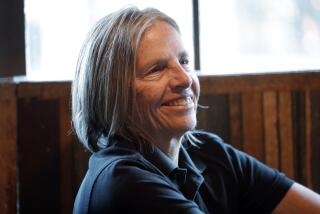A Sept. 11 Empathy Curse
- Share via
I have read many poems responding to the Sept. 11 attacks. Most of them seem rooted not in a response to the event itself but in the poet’s sense of what one should feel or say about such an event: something large-minded, or patriotic, or loyal, or insightful, or moral.
Contrary to that procedure, the art I admire most begins with some real experience. Frank Bidart’s poem “Curse,” in a way shockingly, comes from the poet’s actual response to a terrible and terrifying reality.
The poem is just what its title says it is: a curse on the perpetrators.
As in the traditional Christian idea of a curse, as I understand it, the curse attains and asserts a moral balance or standard. I particularly admire the memorable phrase “a bubble of rectitude” for the ecstasy of self-righteousness that let the terrorists kill thousands of innocent people. In keeping with the Thomist or Augustinian idea that the consciousness of sin is the sin’s punishment, Bidart wishes for the killers--or wishes upon them--a full understanding of the suffering, loss and pain they inflicted.
“Of your rectitude at last disenthralled,” he imagines those who committed the act, burdened at last by the terrible understanding of what they have done, seeking their victims. He imagines the victims spitting them out.
Is this formulation, Bidart’s moral imagining of the crime and its just consequence, itself self-righteous? Has he constructed his own “bubble of rectitude” for himself? His self-doubt, in the resolution of the poem, is a moving engagement with that problem.
Citing the notion of Percy Shelley that empathy, imagining oneself in the skin of another, is the secret core of all morality, Bidart acknowledges with a kind of resigned horror that what he has made of that noble idea is a curse.
*
May breath for a dead moment cease as jerking your
head upward you hear as if in slow motion floor
collapse evenly upon floor as one hundred and ten
floors descend upon you.
May what you have made descend upon you.
May the listening ears of your victims their eyes their
breath
enter you, and eat like acid
the bubble of rectitude that allowed you breath.
May their breath now, in eternity, be your breath.
Now, as you wished, you cannot for us
not be. May this be your single profit.
Of your rectitude at last disenthralled, you
seek the dead. Each time you enter them
they spit you out. The dead find you are not food.
Out of the great secret of morals, the imagination to enter
the skin of another, what I have made is a curse.
--Frank Bidart
*
Robert Pinsky, former poet laureate of the United States, is poetry editor of the online magazine Slate. His latest book of poems is “Jersey Rain” (Farrar Straus & Giroux, April 2001).
*
Frank Bidart’s poem is reprinted with the permission of Three Penny Review.
More to Read
Sign up for our Book Club newsletter
Get the latest news, events and more from the Los Angeles Times Book Club, and help us get L.A. reading and talking.
You may occasionally receive promotional content from the Los Angeles Times.










